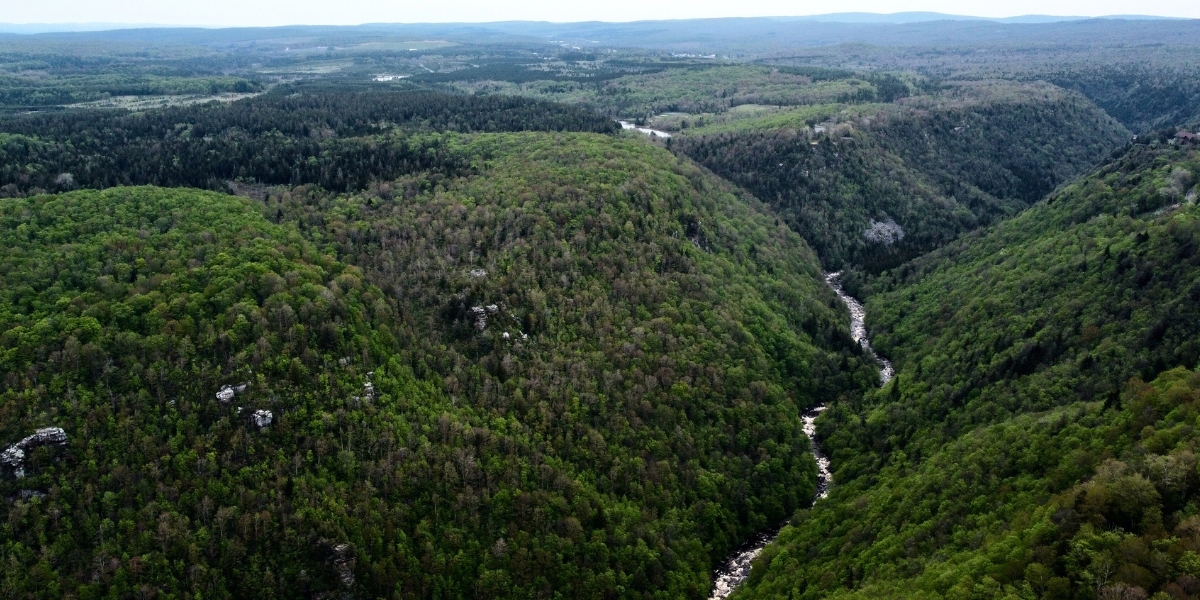By John McFerrin
The United States Forest Service has agreed to buy approximately 2,700 acres of land along the Blackwater River in Tucker County to add to the Monongahela National Forest. The land is in what is called an “inholding.” It is land that is within the original proclamation boundary of the Monongahela National Forest but was never acquired by the Forest Service.
Purchase of this Blackwater Canyon land will bring into public ownership one of the most scenic areas in West Virginia and will provide public access and outdoor recreational opportunities along a key five-mile stretch of the Blackwater River that runs through Blackwater Canyon and includes a portion of the Blackwater Canyon Trail.
Much of Blackwater Canyon was already in public ownership. The land to be acquired is bordered by Blackwater Falls State Park and the Monongahela National Forest. Much of it is visible from the Lindy Point scenic overlook in Blackwater Falls State Park. This purchase means that the entire Blackwater Canyon will now be publicly owned.
The money to buy it will come from the Land and Water Conservation Fund. The Land and Water Conservation Fund is mostly supported by fees and royalties on oil and gas drilling offshore in federal waters. The purchase price is expected to be about 14 million dollars. The Forest Service’s acquisition of the property is expected to be completed by the end of the year.
The West Virginia Highlands Conservancy has a long connection to Blackwater Canyon. There is a rail trail that runs along the boundary between what has long been Forest Service land and the land that the Forest Service is currently buying. WVHC has sponsored hikes along that rail trail.
Both because of Conservancy’s direct connection with the Canyon and because of its specialness, getting the Canyon into public ownership has long been a goal of the West Virginia Highlands Conservancy.
Before 1997, whether or not the Canyon was in public ownership or not did not make much difference, at least so far as the use of the property was concerned. The land was owned for decades by Allegheny Energy; it had originally purchased it with hopes of using the Canyon as a reservoir for a hydroelectric project. Allegheny Energy never pursued the project in any major way so the land in the Canyon sat there. People happily used the rail trail. People walking down the trail barely knew that, if they looked one way, they were looking at Forest Service land. Turn their heads the other way they were looking at private land. The trees kept growing. There is no record of the wildlife ever noticing that some of them were on Forest Service land while their compatriots on the other side of the Canyon were on private land. They just kept enjoying their homes.
All this changed in 1997 when Allegheny Wood Products bought the property, and it became known that its plans for the property including timbering. The purchase price was five million dollars.
The reaction was immediate. A national conservation group offered to buy the land to protect it from timbering. The Sierra Club opposed it. The group Friends of Blackwater was founded primarily to oppose it. The Tucker County Development Authority opposed it.
The West Virginia Highlands Conservancy described opposition to the timbering as “our sacred duty.” Our bylaws describe our purpose as “To preserve and protect areas of particular scenic, geologic, biologic, and historic, wilderness and/or recreational importance in West Virginia.” Nothing fit the bill better than Blackwater Canyon.
The fight to preserve the Canyon was semi-successful. With some encouragement from Senator Rockefeller, Governor Underwood purchased the Lindy Point scenic overlook and made it a part of Blackwater Falls State Park. Later, Governor Bob Wise oversaw purchase of some riverfront property to add to the Park. In later years, Senator Joe Manchin worked behind the scenes toward acquisition of the Canyon by the Forest Service. He was instrumental in reaching the recently announced result of the purchase of 2,700 acres.
At the same time, substantial timbering did take place.
It could have been worse. At one time Allegheny Wood Products wanted to convert to a haul road the rail trail that ran along the boundary separating its property from Forest Service land. Widespread public opposition encouraged the Forest Service to oppose that proposal. The presence of the endangered West Virginia Flying Squirrel and Cheat Mountain Salamander (and the willingness of groups such as the Sierra Club and Friends of Blackwater to sue on their behalf) interfered with the timbering.
Now we begin a new chapter in the life of Blackwater Canyon. It is now all in public ownership. That was the goal of the West Virginia Highlands Conservancy and many, many others in 1997. Now it has been realized. The best time to protect a tree was 27 years ago. The second best time is today.
Cover photo of the Blackwater Canyon by Frank Gebhard.

